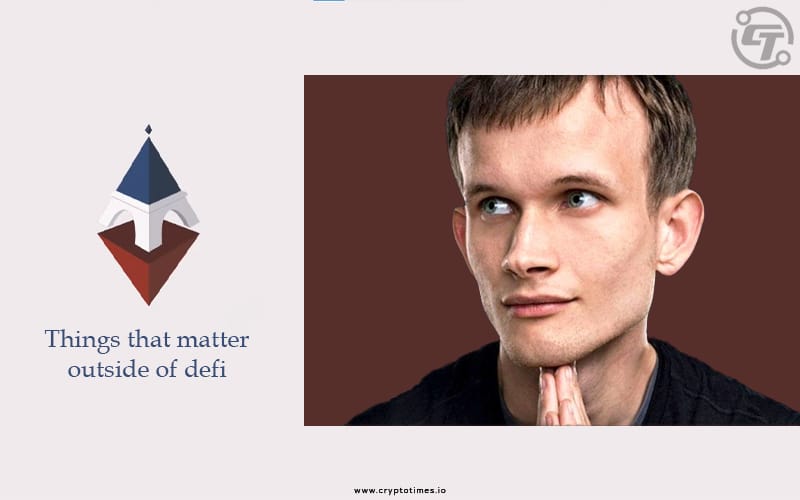At the EthCC in Paris, Vitalik Buterin, discussed the potential for Ethereum to make an impact on other sectors of society, using social media as his primary example on “things that matter outside of DeFi.” Featuring more than 250 international experts as speakers this year, EthCC is the largest and one of the most talked about annual Ethereum events in Europe.
Ethereum blockchain currently derives its value from the DeFi ecosystem. But Ethereum was created for much more than DeFi. Buterin shared his concerns that the smart-contract blockchain was being defined by users’ desire for profit rather than its potential to create value and utility in other centralized fields.
Ethereum, Buterin said, “has always been about taking these ideas of decentralization and trust minimization, experimenting with building and implementing, using many different kinds of mechanisms to areas that go far beyond just finance.”
Why finance defines Ethereum
While recognizing the exponential growth of DeFi, Vitalik Buterin explained that Ethereum “has to expand” beyond the sector. He added that the original vision was to use the blockchain to reinvent many centralized facets of society.
Explaining why financial applications have come to dominate the Ethereum space, Buterin reasoned that is only because “finance is just the area where centralized technology sucks the most.”
“I can send you a centralized email and you will get it within one second. And maybe various intelligence agencies will read it, but at least you can read it one second from now,” Buterin said. “International bank wires do not work that way. They’re still notoriously annoying and inefficient. And there are a lot of these extra frictions that persist in the financial system.”
Buterin on decentralizing social media:
Moving away from DeFi, Buterin focused on Ethereum’s potential use in decentralizing social media. He gave a reference to a tweet by Stani Kulechov about “Twitter on Ethereum”. Buterin said that building out the Ethereum social media ecosystem is something he personally cares about as there is a “widespread belief that existing social media platforms suck, and we need better ones.”
Ethereum as a decentralized login service
Buterin also argued that using Ethereum as a decentralized login service could give users more control of their identities and accounts instead of relying on centralized social media companies that have ultimate control over accounts on their platforms.
“If you screw up, then maybe the big centralized daddy can help you. Well, it turns out that from my first-hand and second-hand experience is that big centralized daddies are often too lazy to actually help you. If you lose your accounts in a lot of these services, often it’s extremely hard to actually get it back.” Buterin said, “So, Ethereum accounts that are social recovery wallets potentially can outcompete the centralized providers and the decentralized providers on both fronts. So you have both better self-sovereignty and better recovery.”
Buterin explained that the growing NFT space could also simplify the process of using your Ethereum address to log in; referencing the decentralized naming app Ethereum Name Service. The service lets users convert their alphanumeric Ethereum addresses in a human-readable format; which are then issued as ERC-721 NFTs.
“Ethereum ecosystem has to expand beyond just making tokens that help with trading tokens,” Buterin said.
Also Read: Chainlink Price Feeds Are Now Live on The Avalanche Mainnet
Vitalik wants to bring Ethereum beyond DeFi. He defines the near-term goals as something that gathers enough support in the Ethereum community and “something that is useful for people to do.”







